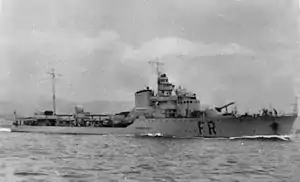Freccia-class destroyer
The Freccia-class destroyer was a class of destroyers built for the Regia Marina (Royal Italian Navy) in the 1930s. Four modified ships were built and delivered in 1933 for Greece.
 Freccia | |
| Class overview | |
|---|---|
| Name | Freccia class |
| Operators | |
| Preceded by | Navigatori class |
| Succeeded by | Folgore class |
| Subclasses | Kountouriotis class |
| Built | 1929–1933 |
| In commission | 1931–1946 |
| Completed | 8 |
| Lost | 6 |
| Scrapped | 2 |
| General characteristics | |
| Type | Destroyer |
| Displacement | |
| Length | 96.15 m (315 ft 5 in) |
| Beam | 9.75 m (32 ft 0 in) |
| Draught | 3.3–4.3 m (10 ft 10 in – 14 ft 1 in) |
| Installed power |
|
| Propulsion | 2 shafts; 2 geared steam turbines |
| Speed | 30 knots (56 km/h; 35 mph) |
| Range | 4,600 nmi (8,500 km; 5,300 mi) at 12 knots (22 km/h; 14 mph) |
| Complement | 185 |
| Armament |
|
Ships
Italian Navy
- Built by Odero, Sestri Ponente
- launched 6 September 1930, completed 25 January 1932
- Captured by the Germans and renamed TA31. Scuttled on 24 April 1945.
- Built by CT Riva Trigioso
- launched 3 August 1930, completed 21 October 1931
- In the Spanish Civil War, on 15 August 1937, she shelled, torpedoed and disabled the Panamanian tanker George McKnight off Tunis.
- Sunk on 8 August 1943 off Genoa by bombing.
- Built by CT Riva Trigioso
- launched 17 January 1932, completed 10 May 1932
- In the Spanish Civil War, on 11 August 1937, she torpedoed and sank the Spanish Republican tanker Campeador in the strait of Sicily.
- Sunk by a mine on 3 February 1943 with the loss of 170 men including Lt. Cdr. Enea Picchio, the commanding officer, while 39 men survived.
- Built by Odero, Sestri Ponente
- launched 26 March 1931, completed 6 February 1932
- Rammed and sank UK submarine HMS Odin on 14 June 1940. Beached herself on 21 June 1942 near Cape Bon and was finished off by torpedoes from the submarine HMS Turbulent.
Hellenic Navy
The Greek Navy ordered four destroyers from Italy in 1929 to a modified design as the Kountouriotis class. The chief difference with the Italian ships was the substitution of four single 120 mm guns (Ansaldo Model 1926) for the twin turrets used in the Italian Navy ships.
- Built by Odero, Sestri Ponente
- launched 21 October 1931, commissioned November 1932
- Sunk by German aircraft, 22 April 1941.
- Built by Odero, Sestri Ponente
- commissioned May 1933
- Served in World War II, decommissioned in 1946, Scrapped 1947.
- Built by Odero, Sestri Ponente
- commissioned May 1933
- Sunk by German aircraft, 20 April 1941.
- Built by Odero, Sestri Ponente
- launched 29 August 1931, commissioned November 1932
- Served in World War II, decommissioned and scrapped in 1946.
The two surviving ships, Spetsai and Kountouriotis, served in the Eastern Mediterranean as part of the Free Greek Navy until late 1943. They were then laid up at Port Said, Egypt for want of Italian spare parts, and because their crews were needed for new ships built in the UK for the Free Greek Navy.
Notes
Bibliography
- Brescia, Maurizio (2012). Mussolini's Navy: A Reference Guide to the Regina Marina 1930–45. Annapolis, Maryland: Naval Institute Press. ISBN 978-1-59114-544-8.
- Campbell, John (1985). Naval Weapons of World War Two. Annapolis, Maryland: Naval Institute Press. ISBN 0-87021-459-4.
- Fraccaroli, Aldo (1968). Italian Warships of World War II. Shepperton, UK: Ian Allan. ISBN 0-7110-0002-6.
- Roberts, John (1980). "Italy". In Chesneau, Roger (ed.). Conway's All the World's Fighting Ships 1922–1946. New York: Mayflower Books. pp. 280–317. ISBN 0-8317-0303-2.
- Rohwer, Jürgen (2005). Chronology of the War at Sea 1939–1945: The Naval History of World War Two (Third Revised ed.). Annapolis, Maryland: Naval Institute Press. ISBN 1-59114-119-2.
- Smigielski, Adam (1995). "Italy". In Chumbley, Stephen (ed.). Conway's All the World's Fighting Ships 1947-1995. Annapolis, Maryland: Naval Institute Press. pp. 195–218. ISBN 1-55750-132-7.
- Whitley, M. J. (1988). Destroyers of World War 2: An International Encyclopedia. Annapolis, Maryland: Naval Institute Press. ISBN 1-85409-521-8.
External links
- Freccia (1930) Marina Militare website